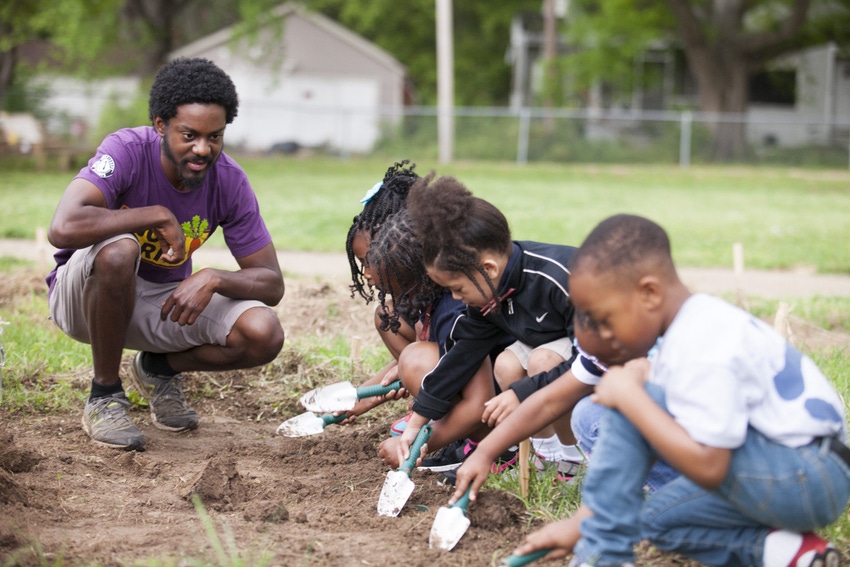Through FoodCorps, AmeriCorps leaders spread out across the country on a mission to bring healthy local foods into schools and teach kids and communities the fundamentals of healthy eating.

 In northwest Michigan, young food leaders are working with area elementary schools to conduct taste tests in school cafeterias to expose children to new kinds of vegetables and inform school food service programs of their local food preferences. Across the country in New York, others are working with a local nonprofit to get students out of the classroom and into gardens, where they can get their hands dirty and explore how fresh herbs and produce are grown.
In northwest Michigan, young food leaders are working with area elementary schools to conduct taste tests in school cafeterias to expose children to new kinds of vegetables and inform school food service programs of their local food preferences. Across the country in New York, others are working with a local nonprofit to get students out of the classroom and into gardens, where they can get their hands dirty and explore how fresh herbs and produce are grown.
When 1 in 3 children in America is obese, schools have a unique opportunity to be a focus point for preventing obesity and developing healthy habits because of how much time children spend there—and how many meals and snacks they eat there. That’s what drives FoodCorps, a team of AmeriCorps leaders charged with connecting school children with real food and encouraging them to adopt healthy habits. That includes planting and maintaining school and community gardens and getting local, healthy food integrated throughout the school.
It started in 2009, when six young leaders came together around their passion for a more sustainable, healthful and equitable food system: Crissie McMullan, who had founded a state FoodCorps program in Montana; Cecily Upton, former youth programs manager for Slow Food USA; Debra Eschmeyer, now executive director of the Let’s Move! campaign; Ian Cheney and Curt Ellis, co-creators of the documentary King Corn; and Jerusha Klemperer, former associate director of national programs at Slow Food USA.
Since then, FoodCorps has blossomed into a nationwide program that this year has placed 205 service members in more than 500 schools in 18 states. Funded by a combination of government (including AmeriCorps) and non-government grants and private donors, FoodCorps partners with state-level organizations like the Oregon Department of Agriculture and the North Carolina 4-H. Those organizations serve as hosts of the FoodCorps programs in their state, deploying service members to a number of service sites (local nonprofits, schools and community-based organizations).
“We can’t be experts on everything that needs to be done at the local level to effect change; these organizations have the capacity, the interest and the expertise to guide and oversee our corps members throughout their states,†said Cecily Upton, co-founder and vice president of programs for FoodCorps.
These service members are hand-picked by FoodCorps and its program partners through a rigorous application and interview process. They’re typically young, educated adults who are passionate about a healthy food system. They’re given a $17,500 stipend and are eligible for certain benefits including health care, student loan forbearance and an education award at the end of their service.
“These AmeriCorps members have some form of experience that would be useful in teaching children and working with agriculture,†said Lori Sobelson, director of community outreach for Bob’s Red Mill. “[FoodCorps] is very particular. They have lots of applicants, and I’m just really pleased with the way that they interview and select.â€
Bob’s Red Mill, along with other natural product and sustainability focused companies including Annie’s, Honest Tea, Subaru, Vitamix and The Honest Co., support the program through FoodCorps’ Corporate Council. [Disclosure: New Hope Natural Media is also part of the Corporate Council.] They provide monetary support and goods and services donations, either on a national lever or in a particular city or state.

FoodCorps is a partner in the inaugural Esca Bona conference,
Oct. 26-28 at the Sheraton Austin at the Capitol.
Learn more here.
Sobelson said Bob’s Red Mill, for example, supports the program financially on a national level. But the Milwaukie, Oregon-based company also supports programs and service members in its home state. It sends product donations to service members as part of a care package and has also put together book kits to help service members teach nutrition to kids.
It’s a win for the company, she added, because supporting FoodCorps aligns with its mission of spreading the good word about nutrition, including whole grains. “We have a real interest in not only educating about good nutrition, but for us, we have the benefit of providing healthy foods to support that,†she said.
Through its rigorous evaluation and impact work, FoodCorps says that its service members reached some 182,000 kids last year alone. But how does it know it’s having an impact?
For one, “our corps members complete a vegetable preference survey to measure shifts in attitudes in groups of kids,†Upton said. They also conduct a healthy schools progress report that measures big-picture changes across participating schools and evaluates what students are eating in the lunchroom. While doing this, they’re also building a base of evidence to support the value of healthy school food to policymakers.
“If we can reach our kids and help them understand and change their behavior and eating habits to try foods and encourage their family to make healthy choices, then we’ll make headway,†Sobelson said. “It’s an uphill battle, and we’re doing something.â€
About the Author(s)
You May Also Like




